
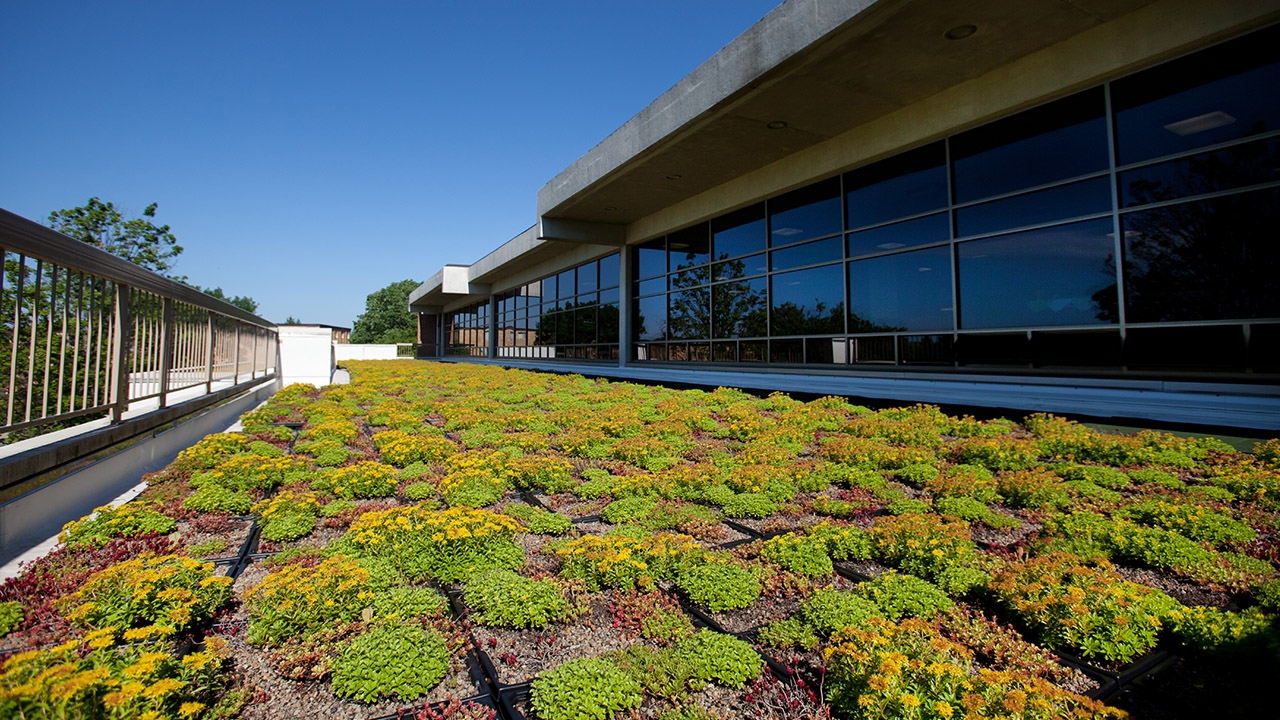
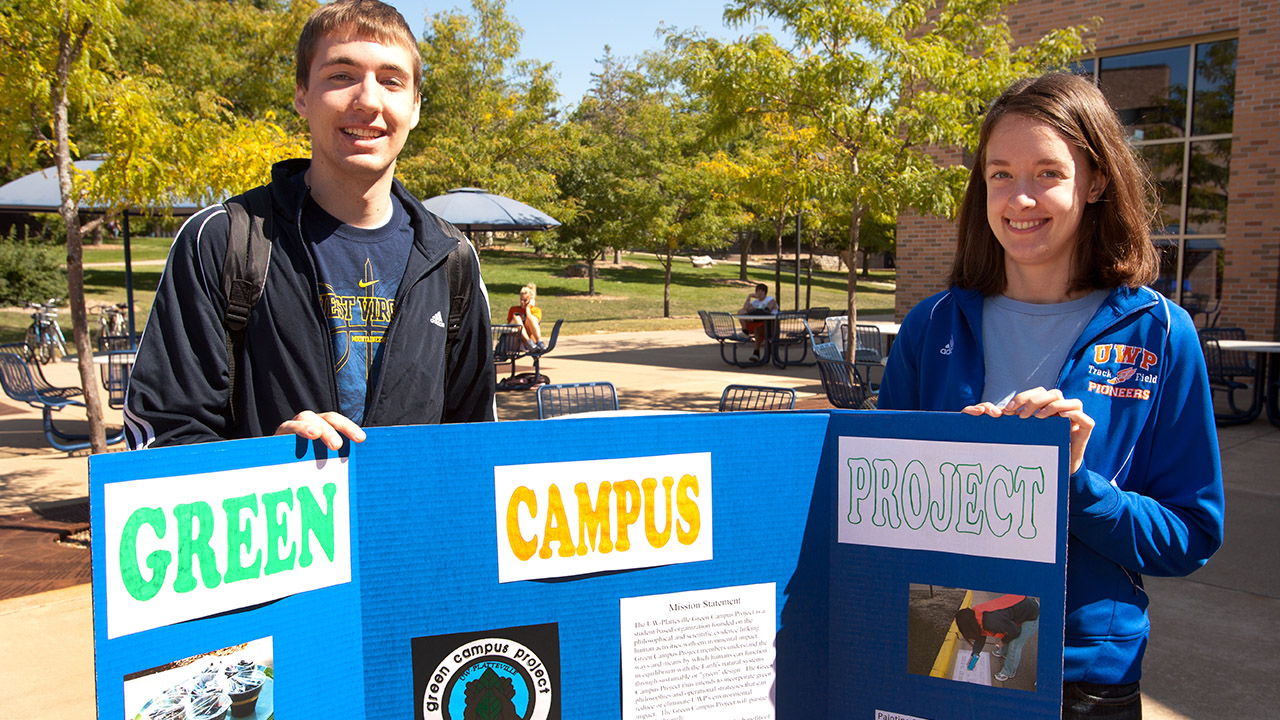
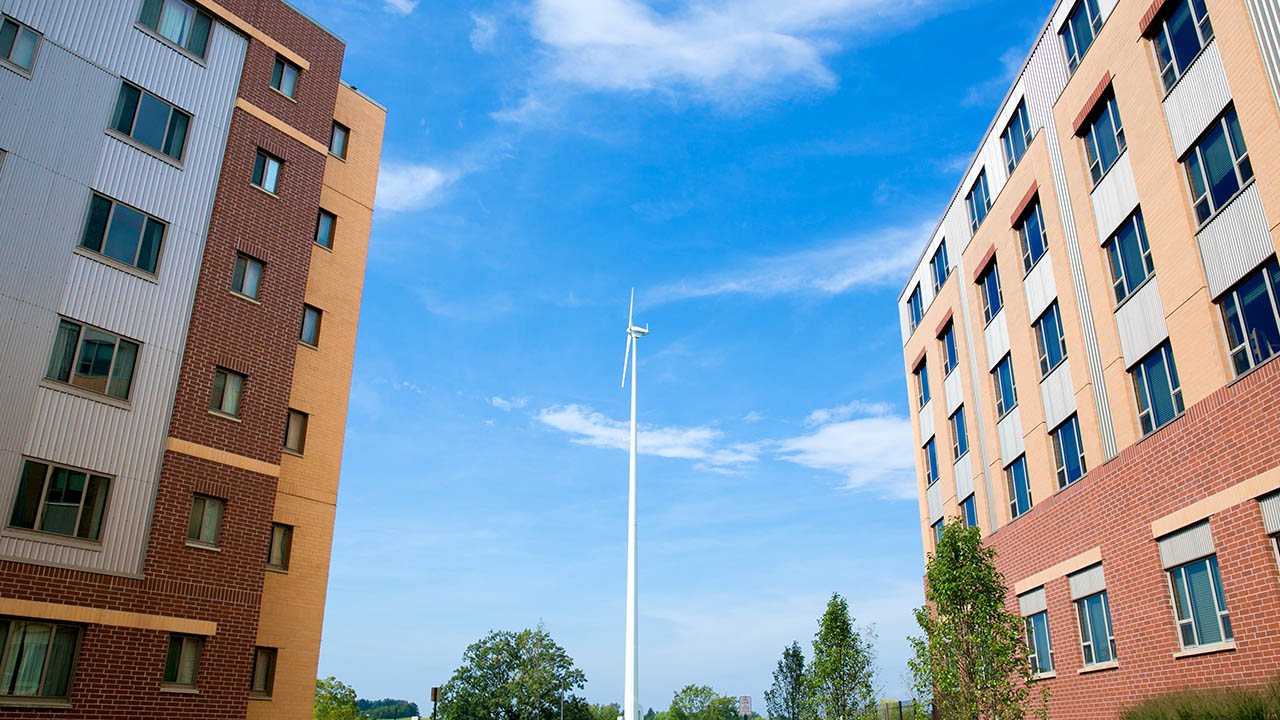
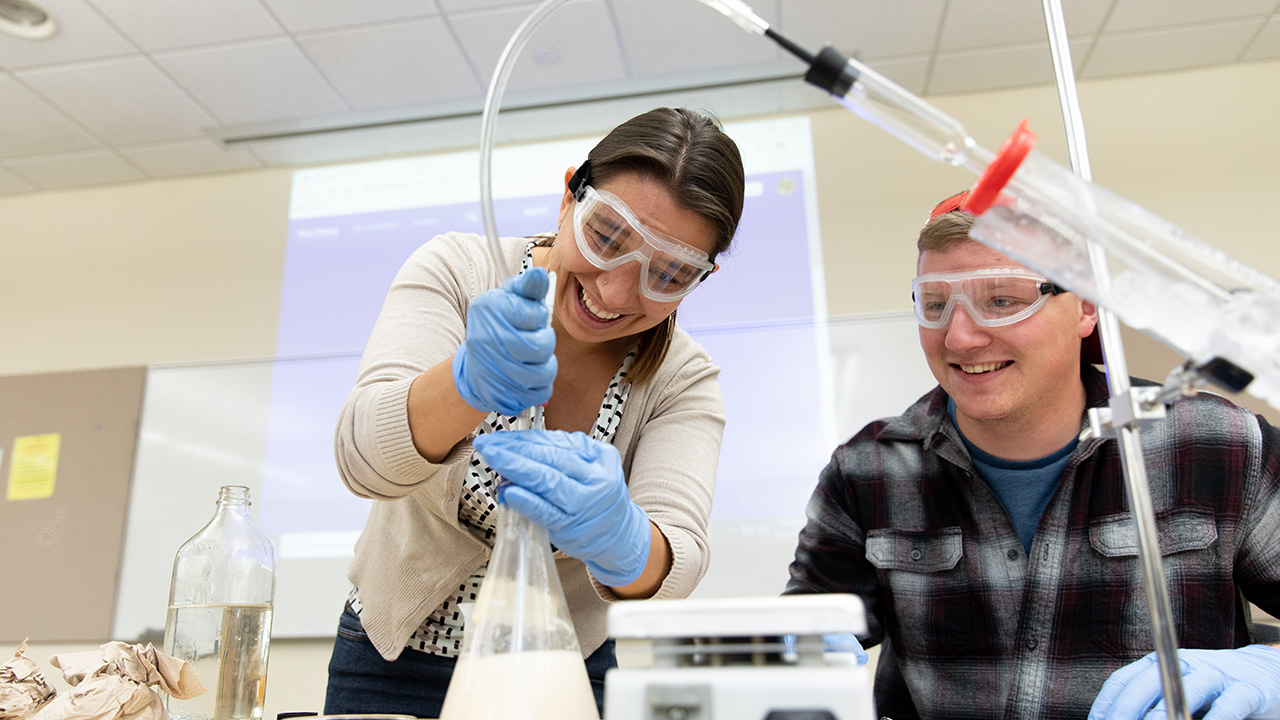
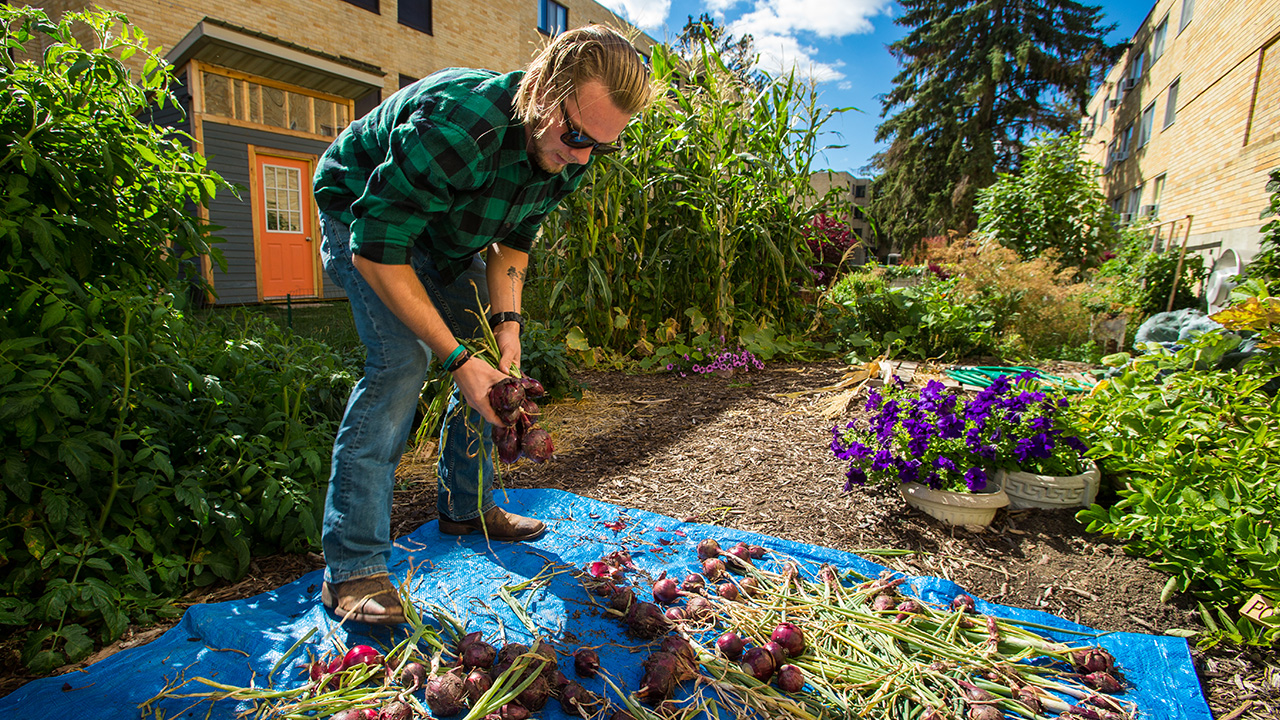
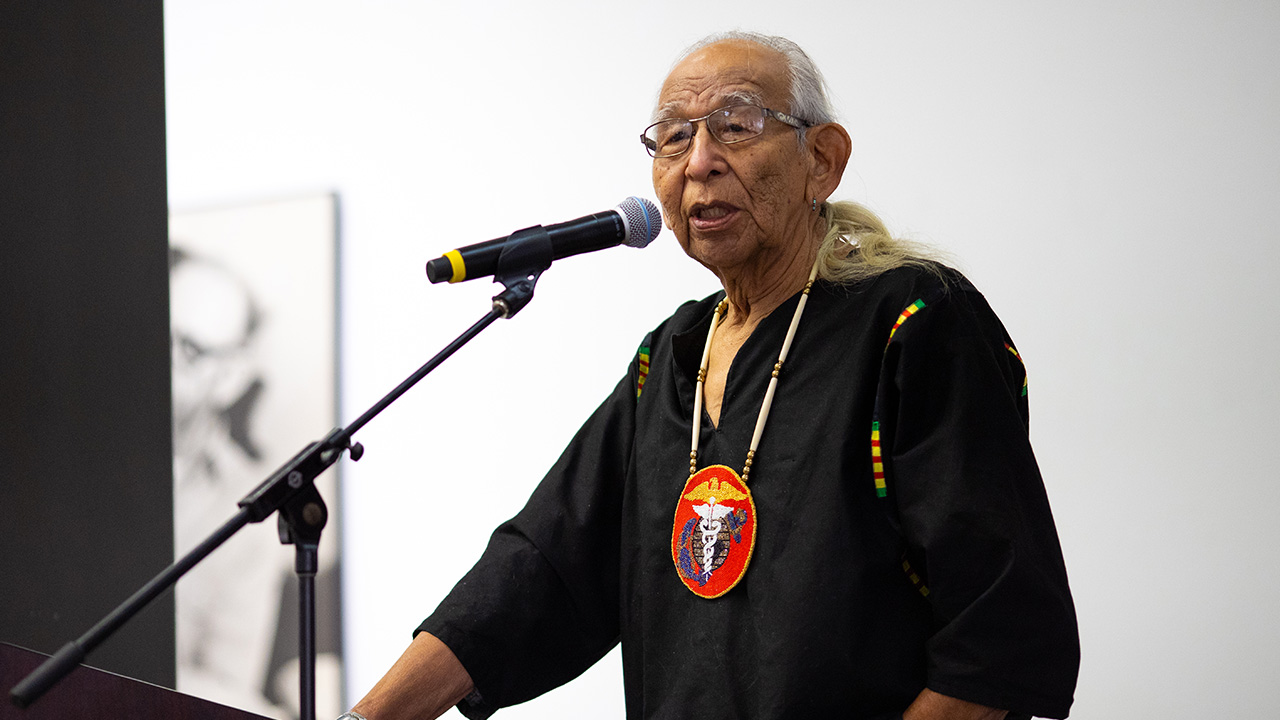
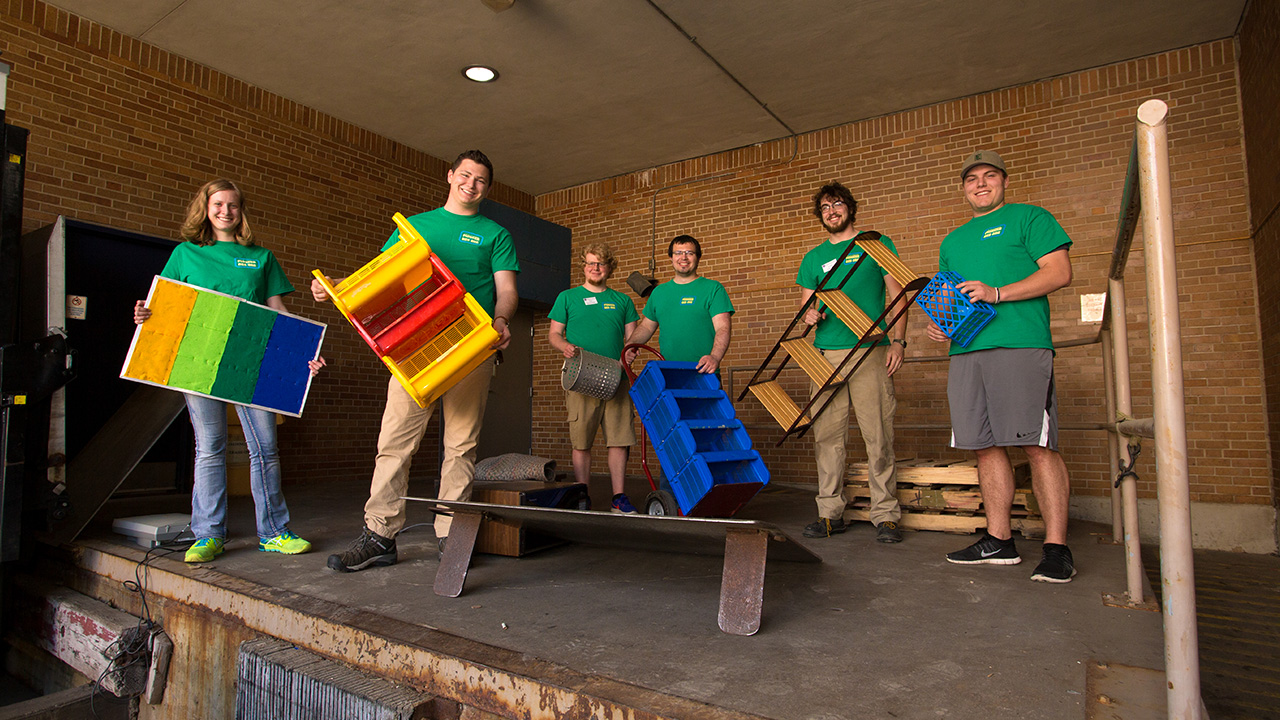
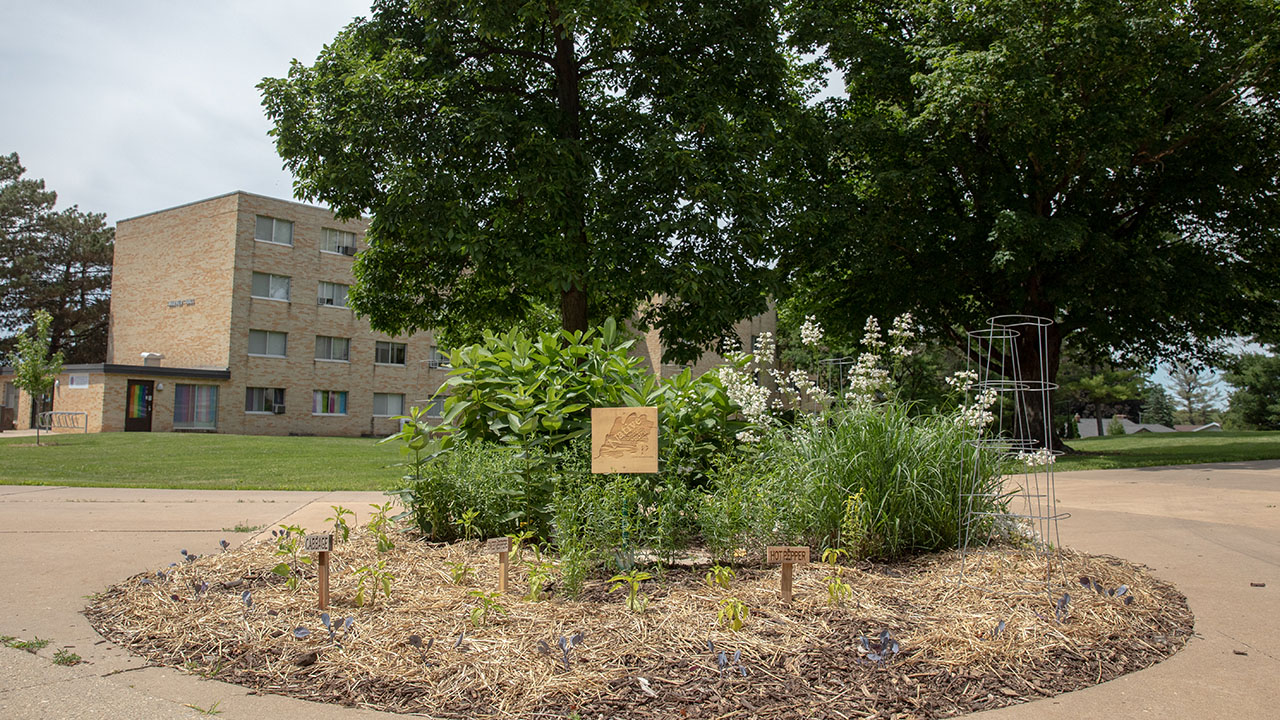

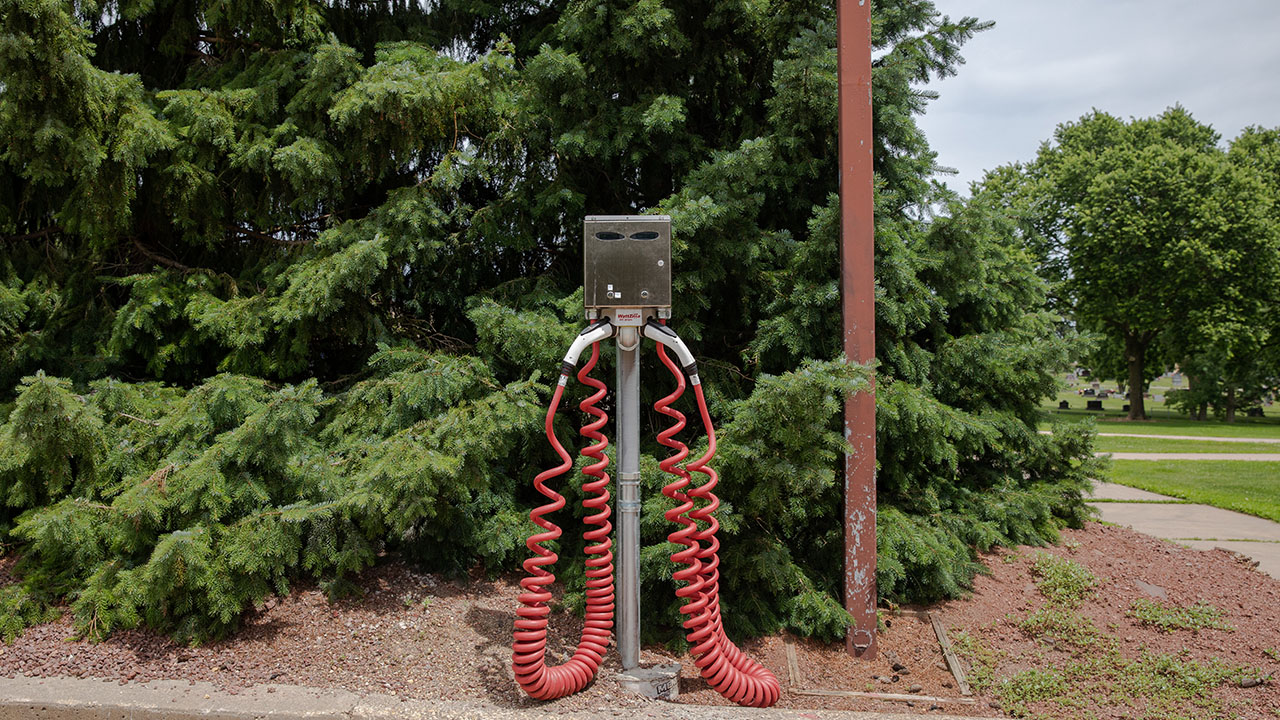
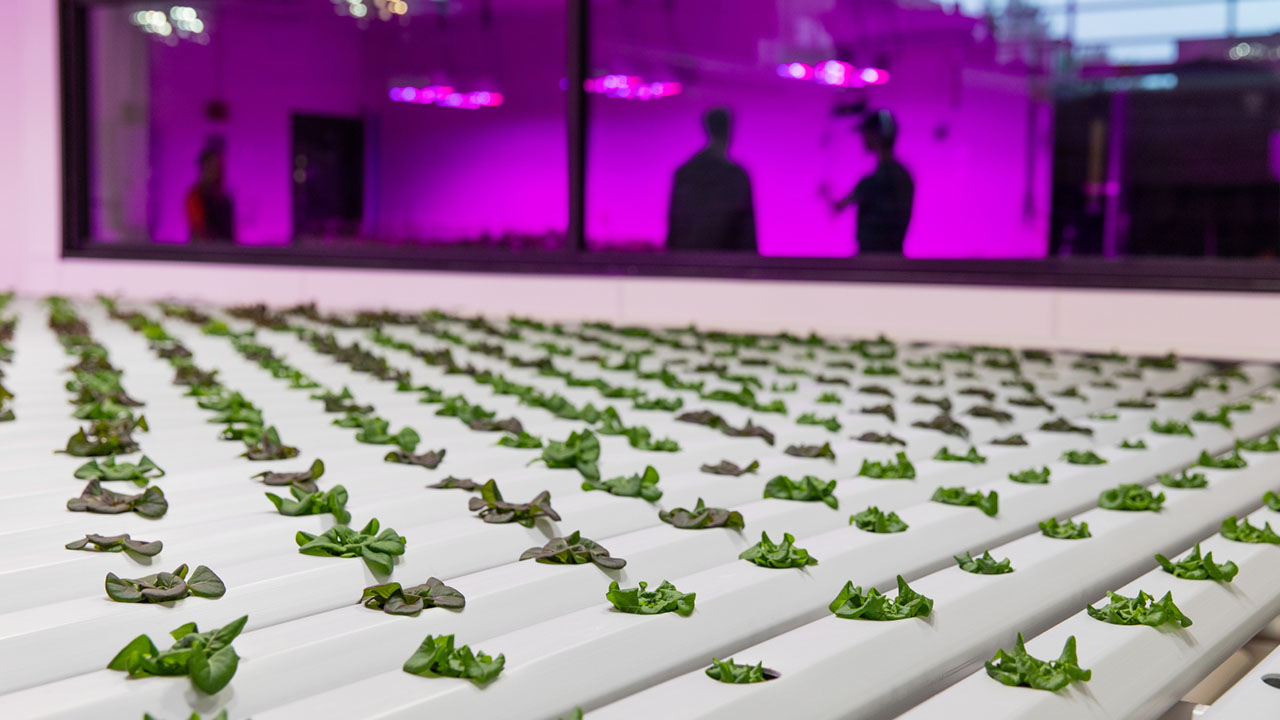
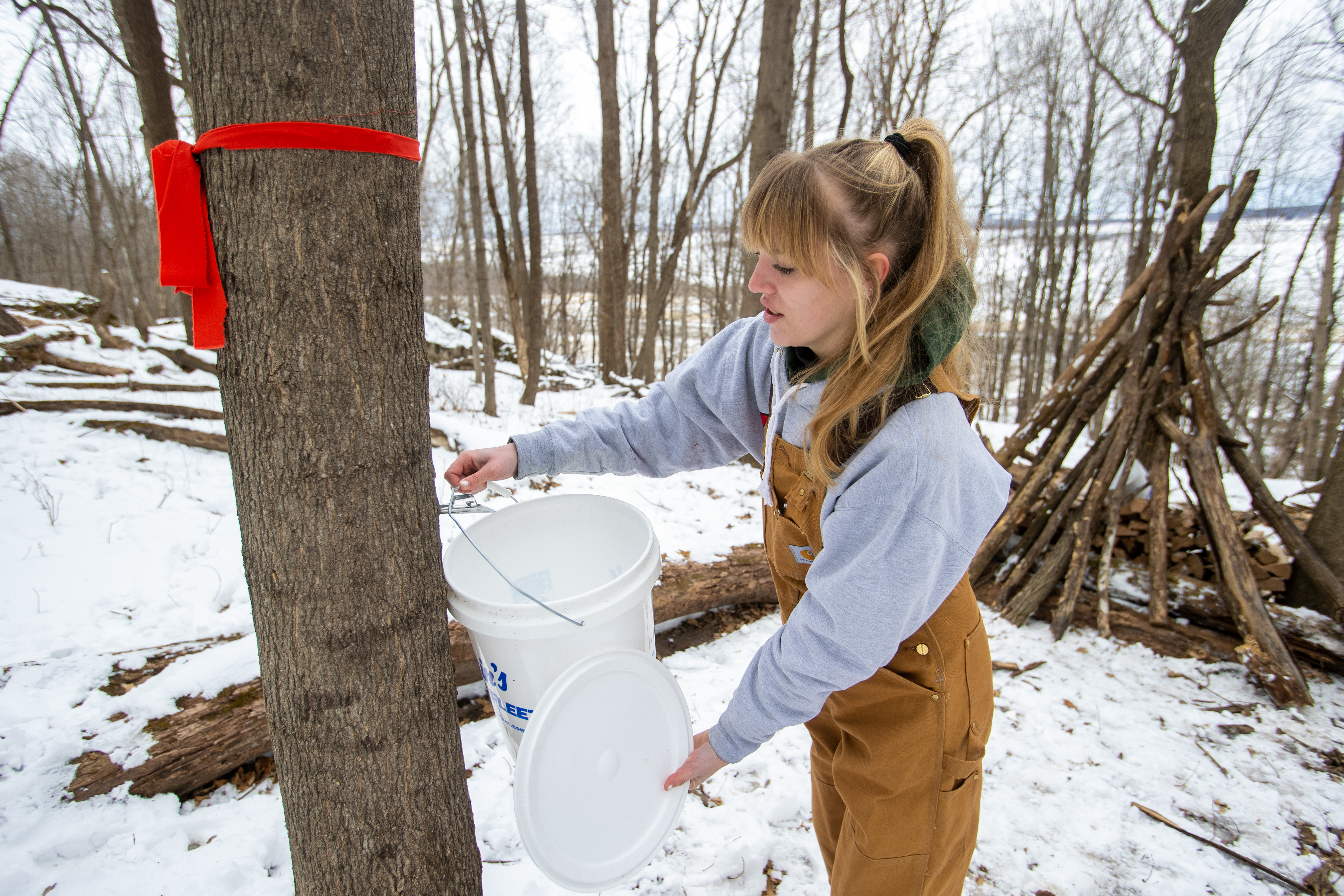
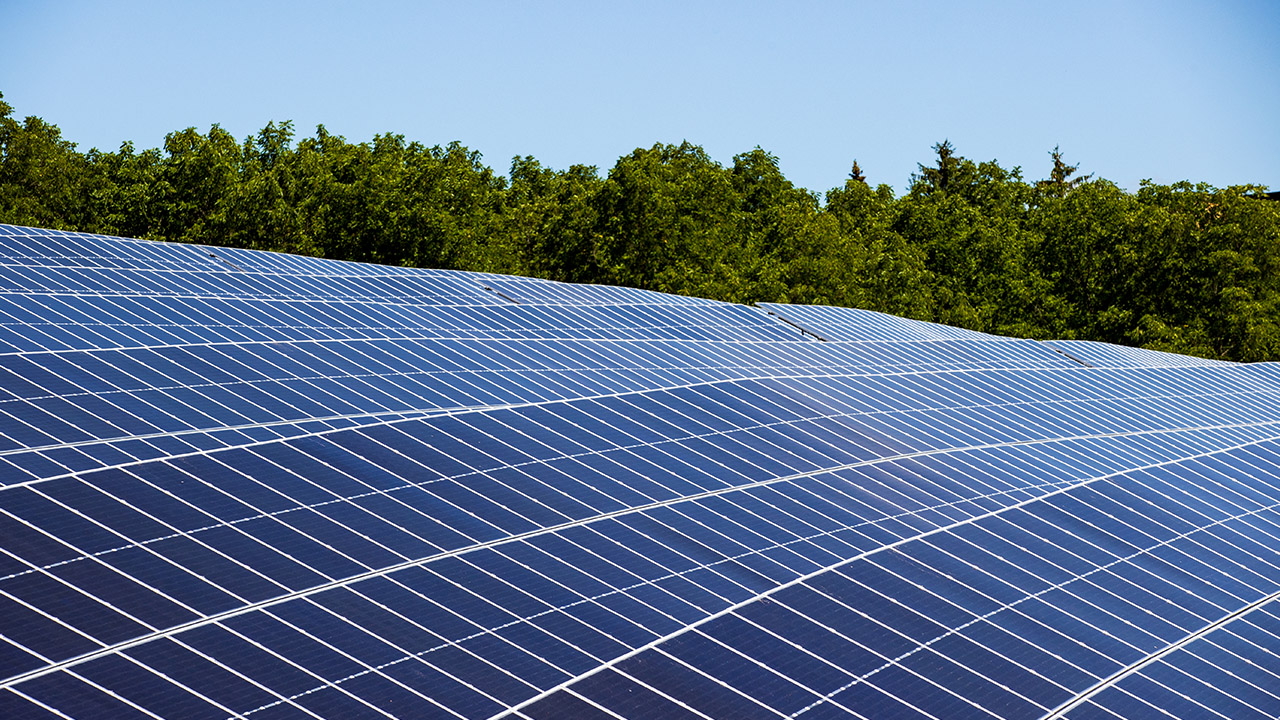
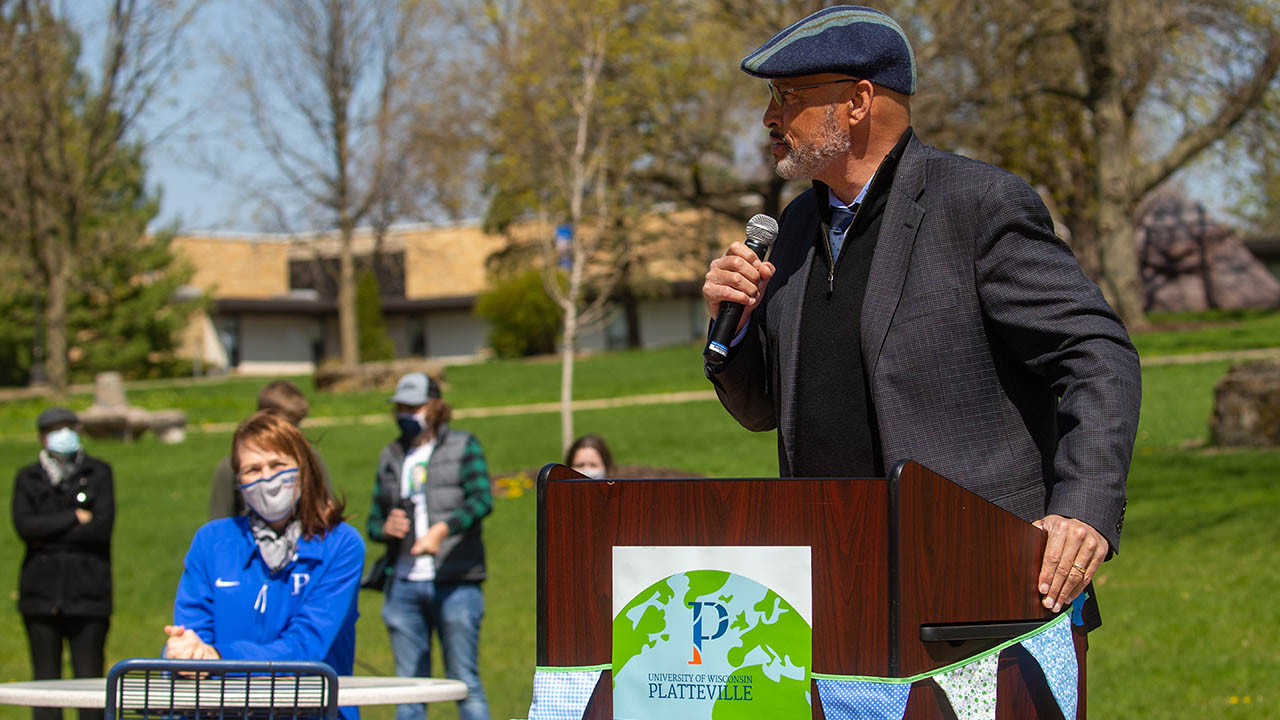
Located in the ecologically unique Driftless Region, the University of Wisconsin-Platteville has long played an important role in sustainability, both on campus and in the wider region. From the first wind turbine installed in 2011 to the 2.4 megawatt solar array installed a decade later, UW-Platteville has remained unwavering in its commitment to sustainability. See a full timeline of sustainability highlights below.
Many of today’s students – like Ryan Lodico and Megan Kaufmann – are continuing the tradition of advocating for sustainability on campus.
“I’ve been interested in sustainability for a lot of my life, but I didn’t get involved in advocacy until I came to UW-Platteville,” said Lodico, a senior engineering physics major from Moline, Illinois. He joined the student organization Renewable Revolution his freshman year and became involved in advocating for the solar array.
“I really liked how hands-on it was and how much of a concrete goal we had,” said Lodico. “The number one highlight from my time here has been how easy it has been to talk to our administration and make real change happen. Within the four years I’ve been here, we’ve actually seen a physical project implemented on campus [the solar array]. That came directly from conversations we had with the chancellor and senior leadership. I don’t think there are many universities out there that you can meet with the highest leaders and talk about real solutions in real time.”
Kaufmann said she also has always had an interest in sustainability, but became more involved when she came to UW-Platteville. Originally a biology major, she eventually decided she could make more of an impact with environmental engineering. She is currently the president of Sustainability Club – formerly the Green Campus Project.
“Sustainability is the future – it’s whether or not we have the future,” said Kaufmann, who is from Sherrill, Iowa. “What we do decides the worlds we are going to grow up in and the generations following us – and even whether or not there are generations following us.”
With the new solar array scheduled to go online June 3, members of the UW-Platteville community have their eyes to the future, including Lodico and Kaufmann, who are hopeful about future classes of UW-Platteville students driving more sustainability initiatives on campus.
“I think UW-Platteville is a unique example of the different ways students care about sustainability,” added Lodico. “Not only does our generation put a high priority on sustainability, but people at UW-Platteville come from different backgrounds and perspectives on sustainability. Some care about the innovation of sustainability – like electric cars, for example, or anything in STEM. For some students, it comes down to the genuine love of the outdoors, and we live in a very outdoorsy state. Some students love to be involved in activism and promoting change. Our school is a good example of not everyone caring about sustainability for the same reason, but that end goal is still the same.”
For more information on sustainability at UW-Platteville, visit www.uwplatt.edu/department/sustainability.
UW-Platteville Sustainability Timeline
The following timeline recognizes some of the highlights of sustainability throughout the years at UW-Platteville.
- 2008: Environmental Impact Committee refocused and renamed to Environmental Sustainability Committee.
- 2008: Sustainable and renewable energy systems minor launches.
- 2008: Green roof installed on Glenview Commons.
- 2009: Green Campus Project (student organization) established.
- 2011: Campus Sustainability Award Program is established.
- 2011: A wind turbine is installed on campus.
- 2012: UW-Platteville hired its first sustainability coordinator.
- 2012: Sustainable and renewable energy systems major launches – one of only a handful of its type in nation.
- 2012: UW-Platteville is the Wisconsin RecycleMania Grand Champion.
- 2012: Campus dashboard is launched for tracking energy use.
- 2013: First campus sustainability plan is approved.
- 2014: The first Campus Edible Garden is created.
- 2014: Ditch the Dumpster program begins – this residence hall donation program diverts an estimated 10 tons from the landfill each year.
- 2015: The Indigenous Peoples Day Lecture series is established.
- 2015: Pioneer Restore is created, which has led to a 35% reduction in landfill items.
- 2015: The student-run Sunflower Oil business is created.
- 2015: The Platteville Transit System is established, in cooperation with the City of Platteville. This mostly rural, fixed-route bus system in Wisconsin provides 60,000 annual rides for students and community members.
- 2016: UW-Platteville participates in the Association for Advancement of Sustainability in Higher Education’s (AASHE) Sustainability Tracking, Assessment, and Rating System (STARS) for the first time.
- 2016: Campus Green Fund is established.
- 2016: Native Plant Beds and more edible gardens are installed around campus.
- 2017: A 20-day pilot program brings a herd of goats to Memorial Park.
- 2017: Triple-Bottom-Line workshop for faculty and staff is offered to help integrate sustainability across campus in both teaching and operations.
- 2018: Electric vehicle charging station is installed on campus.
- 2018: UW-Platteville earns a silver star rating in the AASHE STARS program.
- 2019: University Strategic Plan emphasizes sustainability as one of the primary pillars of investing in our future.
- 2019: Re-usable to-go containers are introduced in the Pioneer Crossing – the most populated dining venue on campus.
- 2019: Pioneer Provisions, a food pantry for students, is established.
- 2019: Hydroponics Lab opens in Glenview Commons – operated solely by students, the 1,500-square-foot lab offers space to grow lettuce, used for Dining Services.
- 2020: Established a sugar bush among old-growth sugar maples on the Platte Mound.
- 2021: UW-Platteville earns a second silver star rating in the AASHE STARS program, with progress toward gold.
- 2021: Students conduct prescribed burns on campus.
- 2021: The university heating plant converts from using coal to natural gas, which is estimated to reduce heat-related emissions by 20%.
- 2021: The UW-Platteville campus in Baraboo becomes a member of the Ice Age Trail Alliance.
- 2021: UW-Platteville builds a 2.4 megawatt solar array. The largest state-owned solar array, it is estimated to reduce 2,300 tons of carbon emissions each year.
- 2021: Chancellor Dennis J. Shields pledges to commit the university to become a zero-waste campus by 2035. Students were the driving force behind the initiative, researching and presenting a proposal to the chancellor.
- 2021: Inaugural Spring Swap with the City of Platteville and Faherty Inc. allowed students and community members to exchange gently used items, diverting an estimated 10,000 pounds from the landfill.
- 2022: UW-Platteville’s newest building, Sesquicentennial Hall, seeks LEED certification.